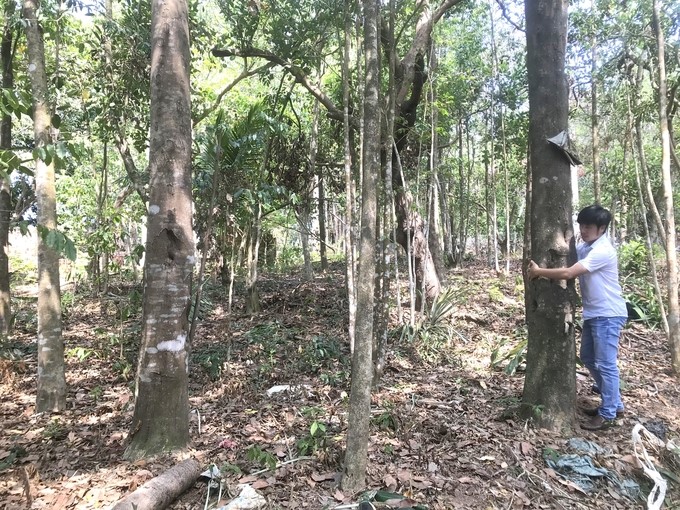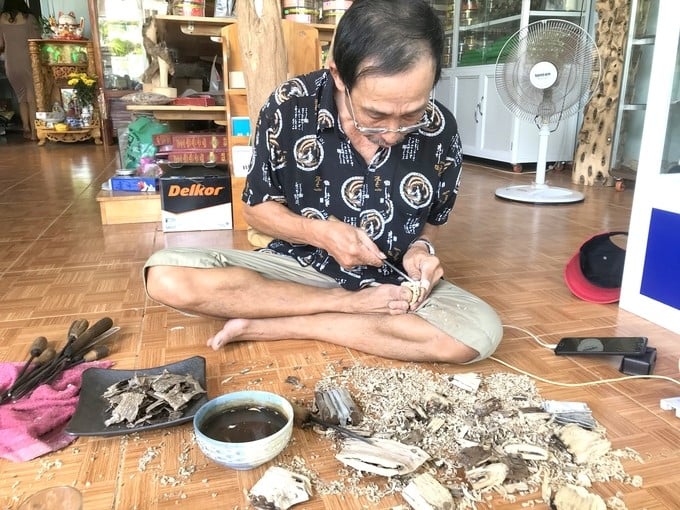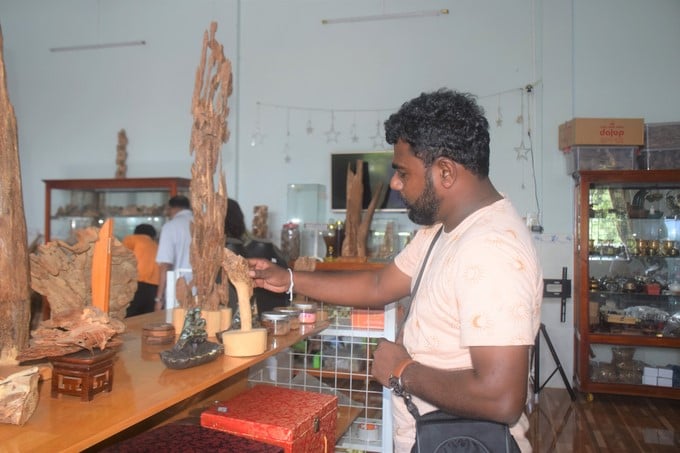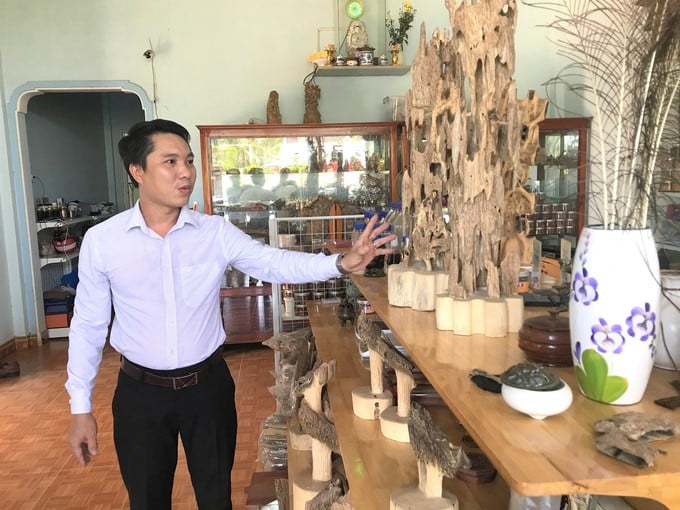May 31, 2025 | 16:54 GMT +7
May 31, 2025 | 16:54 GMT +7
Hotline: 0913.378.918
May 31, 2025 | 16:54 GMT +7
Hotline: 0913.378.918

2ha of aquilaria crassna planted by Mr. Toan since 1997 have been transplanted with bio-products to create agarwood for a long time, but he has saved it and not yet exploited it. Photo: V.D.T.
Mr. Nguyen Huu Toan (65 years old) in An My commune (Hoai An district, Binh Dinh) is a person who soon realizes that one day aquilaria crassna in the forest will be exhausted, which means that the source of agarwood in nature will no longer exist. Therefore, he bought land to plant aquilaria crassna 27 years ago.
Currently, Mr. Toan owns 2 ha of 26-year-old aquilaria crassna, over 5 ha of 19-year-old ones, and 6 ha of 15-year-old ones. Agarwood transplanted in Mr. Toan’s above-mentioned areas of aquilaria crassna is very old and could be exploited, but he saved it. Because, according to his explanation, after transplanting agarwood, the longer the reserve of aquilaria crassna, the higher the agarwood reserve, with no less quality than that of agarwood exploited from nature, so its value becomes higher.
"In 1996, I bought 2 ha of land across the street in front of the house, nursed the aquilaria crassna seedling, and started planting in 1997. Later, wherever on Hoai An land was sold forest farmland, I bought it to grow aquilaria crassna. So far, I have owned more than 13 ha of aquilaria crassna at many different ages. All my trees have been transplanted with agarwood for many years, but I do not exploit them. Because, after transplanting bio-products to create agarwood, the longer the reserve of aquilaria crassna is, the higher the agarwood reserve and quality will be," said Mr.Toan.
To grasp the secret of successful agarwood transplantation, Mr. Toan had to go to all agarwood regions in the country to study techniques. "All trees affected by external influences create a wound, and latex will be produced at that wound. The latex of all trees is of no value, except for the latex of aquilaria crassna, which produces agarwood, so that tree species is of high value".
For self-planted aquilaria crassna, in order to create agarwood, it is first necessary to drill a hole, then transplant finished products to create agarwood. In the early days, agarwood creators often transplanted chemicals into aquilaria crassna. The chemicals created agarwood very quickly, but the quality was poor. Now, bio-products are substituted for chemicals, and although the creation time is longer, the quality is no less than that of agarwood exploited from nature.

A worker is picking agarwood from aquilaria crassna exploited by Mr. Toan. Photo: V.D.T.
In addition to more than 13ha of aquilaria crassna planted for decades but not yet exploited, in order to have agarwood raw materials for manufacturing products for domestic and foreign markets, Mr. Toan also buys standing aquilaria crassna from people nationwide planted in their milpas or gardens, then transplants agarwood to create raw materials.
"Every year, I buy about 1,000 aquilaria crassna with a diameter of 18 cm or more to transplant agarwood. After transplanting bio-products, it takes two years to exploit them, so every year I have to spend several billion dongs to buy standing aquilaria crassna to be able to continuously exploit agarwood. Only in this way will the family's agarwood manufacturing facility not be interrupted in terms of raw materials.
With more than 13 ha of aquilaria crassna my family transplanted with bio-products, if it is not exploited until 30 years later, the agarwood will be jet-black. By that time, agarwood is no longer agarwood but gold or diamond because its value is a hundred times higher than the agarwood exploited now, "said Mr. Nguyen Huu Toan.
At the beginning of his start-up, Mr. Nguyen Huu Toan's agarwood products were exploited from the areas of standing aquilaria crassna that he bought, transplanted to create agarwood, and sold as raw materials to traders in Khanh Hoa. In 2013, due to the economic crisis, Mr.Toan's son, Mr. Nguyen Huu Tri, who was working as a port engineer in Saigon, lost his job and had to go back to his hometown to help his parents.

Mr. Nguyen Huu Tri (yellow shirt)—Mr,Toan's son—is explaining how to make fine art products from agarwood to Sri Lankan customers. Photo: V.D.T.
Since Mr. Tri's return, Mr. Toan's agarwood facility is no longer selling agarwood as raw materials as before, but it is being processed by Mr. Tri into very eye-catching fine art products. With abundant English knowledge, Mr. Tri advertises the family's agarwood products on social networks. Unexpectedly, his advertising attracted many customers around the world, and Mr. Toan's agarwood products began to export from there. So Mr. Tri left Saigon and stayed in his hometown to continue the family’s business.
According to Mr. Toan, at present, his family's products made from agarwood are very abundant. Regarding incense, there is stick incense, coil incense, cone incense, and incense without burning or heating. Agarwood products include agarwood pieces, agarwood lumps, and agarwood essential oils. Fine art products include agarwood pens, fans, bracelets, necklaces, ornamental plants, etc.
Besides the domestic market, the fine art products made from agarwood by Mr. Toan's family are exported to markets such as Japan, Korea, the Philippines, Sri Lanka, India, Saudi Arabia, Kuwait, Qatar, and Taiwan.

A Sri Lankan customer is admiring the fine art products made from agarwood on display at Ba Toan Agarwood Company. Photo: V.D.T.
"My family's agarwood products have been exported since 2015, and the volume of exported products is steadily increasing. Every year, my family attains a revenue of VND 500 million to VND 1.5 billion.
"Currently, young artificial agarwood pieces are priced from a few million to several tens of millions of VND per kg, while high-end products are priced from USD 250 to USD 2,000/kg. The older the agarwood, the higher the price. Since 2020, due to the impact of the COVID-19 pandemic and then the global economic downturn, the export of agarwood products has decreased more than before, but the family's customers still regularly import goods despite importing less quantity," said Mr. Nguyen Huu Tri.
At the end of June, we had the opportunity to visit Ba Toan Agarwood Company, located in Long My village, An My commune (Hoai An district, Binh Dinh). By chance, we met a group of customers from Sri Lanka to visit the agarwood manufacturing facility of Mr.Toan’s family and search the market. Mr. Nguyen Huu Tri brought the Sri Lankan tourists to visit the products of agarwood pieces, agarwood lumps, and fine art products made from agarwood displayed at the company. The products were all surprised and praised by this tourist group.

Mr. Nguyen Huu Tri, Mr. Toan's son, with fine art products made from agarwood. Photo: V.D.T.
According to Mr. Toan's share, his foreign customers mostly appreciate that Vietnam's agarwood has a more special aroma than that of other countries in the world. Therefore, many countries have planted a large area of aquilaria crassna but still buy seeds from Mr. Toan for trial planting.
Mr.Toan's biggest concern is that at present, the aquilaria crassna created agarwood is only exploited to 10–20% of its inherent potential; the rest is almost only used as fuel, which is very wasteful. For example, the bark of aquilaria crassna, which has a very flexible material, does not know what to use.
"The most pressing issue in our manufacture of agarwood products today is the location of the production facility. Previously, the production facility was located in Long My village, An My commune (Hoai An district); later, due to polluting production activities, we had to move to Dien Khanh neighborhood in Hoai Duc ward (Hoai Nhon town).
"Now, Dien Khanh is still sparsely populated, so we can still manufacture. Later, when houses grow thick, my production facility will have to be relocated. Recently, Hoai An District People's Committee has promised to arrange for us a premises in an industrial park to stabilize production," said Mr. Nguyen Huu Toan.
Translated by Huyen Vu Thu

(VAN) Seafood by-products are opening a new path, combining green growth and technological innovation to enhance the industry's value.

(VAN) Mr. Nguyen Thanh Cong, Vice Chairman of the Son La Provincial People's Committee, reflects on Son La’s journey from barren hills to fruitful orchards after a decade of hard work.

(VAN) FAO’s Director-General addresses the 5th Baghdad International Water Conference.
/2025/05/26/1716-4-nongnghiep-191706.jpg)
(VAN) Chain linkages, technological innovation, and raw material zoning are three strategic pillars for the coconut industry to strongly develop and elevate its position on the global agricultural map.
![Advanced mariculture – an inevitable trend: [4] Accompanied by scientists](https://t.ex-cdn.com/nongnghiepmoitruong.vn/608w/files/sohk/2025/05/13/1941-pgsts-vo-van-nha-140958_717.jpg)
(VAN) According to Assoc. Prof. Dr. Vo Van Nha, Director of the RIA III, the development of advanced offshore mariculture is no longer an option but an essential path for Vietnam’s fisheries sector.

(VAN) Vietnam is intensifying the development of mollusk farming areas that meet international standards, aiming for sustainable growth and enhancing its export position in the global seafood market.
![Advanced mariculture – an inevitable trend: [3] Policy-driven momentum](https://t.ex-cdn.com/nongnghiepmoitruong.vn/608w/files/doanhtq/2025/05/21/0104-0616-0348-nuoi-bien-170339_789.jpg)
(VAN) To ensure the success of offshore mariculture that uses advanced technologies, it is essential to establish supportive policies that inspire both individuals and enterprises to invest with confidence.